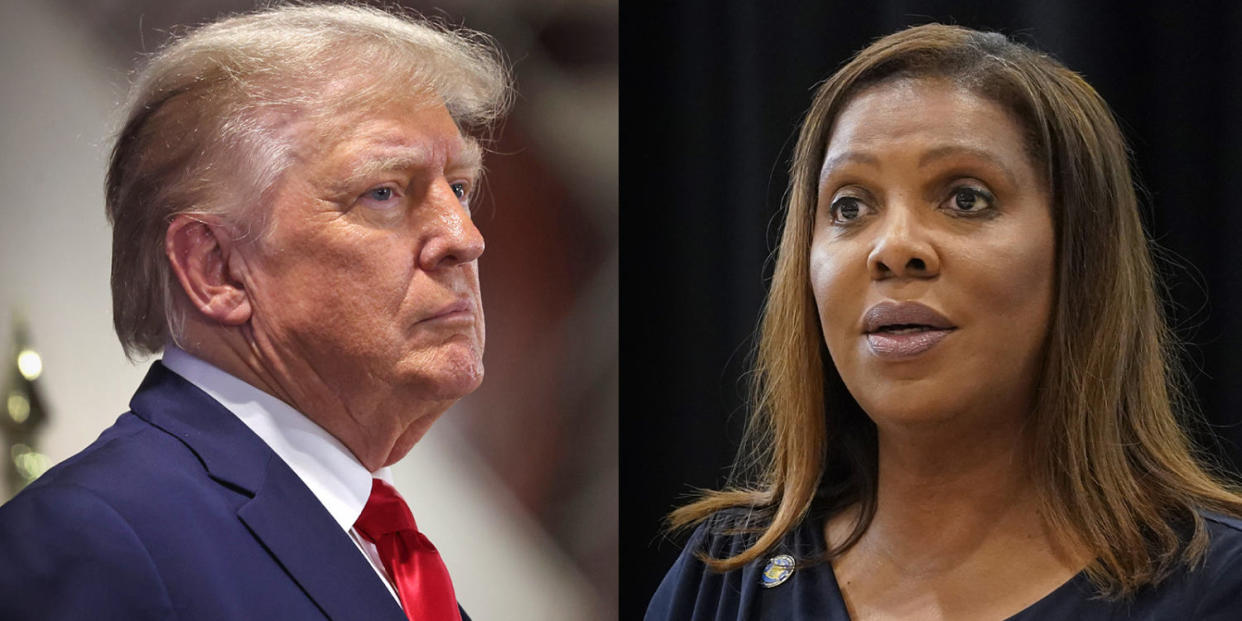Judge hears arguments over scope of trial in New York's civil suit against Trump

- Oops!Something went wrong.Please try again later.
- Oops!Something went wrong.Please try again later.
Attorneys for Donald Trump and the office of New York Attorney General Letitia James argued over the scope of the forthcoming trial in the state's civil suit against the former president before a New York judge Friday.
New York Supreme Court Judge Arthur Engoron began the pretrial hearing by outlining that he will be reviewing motions for summary judgment from both sides. Trump's lawyers have asked for all 7 causes of action in the New York attorney general's complaint to be dismissed, and James claims that the defendants have made frivolous arguments, Engoron said.
Trump's lawyers contended that James has "no valid authority" to sue, that the lawsuit was filed outside the statute of limitations and that her office has “failed to demonstrate any even theoretical harm to anyone, public or private.”
James's case is "out of context," Trump lawyer Christopher Kise said during the hearing, insisting that the defendants did not commit fraud. He said the attorney general's arguments boiled down to, "Believe me, this is fraud."
James' office has asked the court to find the Trumps and their family business, the Trump Organization, liable for fraud even before the trial is set to begin Oct. 2. "The undisputed evidence establishes that Defendants employed a variety of deceptive schemes to grossly inflated values for many of Mr. Trump’s assets," her office wrote in a filing.
James' office previously said there's an "overwhelming amount of evidence establishing beyond dispute" that Trump and his older sons engaged in "repeated and persistent fraudulent use of the false and misleading [Statements of Financial Condition] in connection with business transactions with banks and insurers." Therefore, the state asks that the court find Trump liable for fraud.
The inflation of assets committed by the Trump Organization is “staggering," Andrew Amer, a lawyer for the attorney general’s office, said during the hearing.
Kise, meanwhile, contended that "valuations are highly subjective," for example, "I may think my house is worth 5 million and you may think it's worth 5 cents.” James is "prosecuting the defendants for engaging in successful business transactions," he said.
Amer disputed Kise's argument, saying valuations based on market conditions and appraisals are the correct ones.
James has alleged that Trump overstated his wealth by valuing properties at amounts that “significantly exceeded professional appraisals of which his employees were aware and chose to ignore.”
Kise asserted during the hearing that disclaimers on Trump's financial statements do not show “a capacity or tendency” to deceive, and that while appraisals may be subject to debate, those obtained by Trump were not fraudulent.
On Tuesday, Sept. 26, the judge said he would issue an order on the two summary judgments — one from each side — and the attorney general's request for sanctions. He said if he sides with the defendants’ summary judgment there will be no trial.
In James' office motion for partial summary judgment, the state alleged that Trump regularly overstated his personal net worth to financial institutions, by as much as $2.2 billion one year.
Trump and his lawyers, who have denied any wrongdoing, have attempted to get the case thrown out multiple times. Earlier this month, James asked the state Supreme Court to sanction Trump, his sons Eric and Don Jr., others related to the family business and Trump's attorneys for a total of $20,000.
James first brought the case against Trump in September 2022, alleging that the former president and his older sons engaged in efforts to inflate Trump’s personal net worth to attract favorable loan agreements. James alleges that there were more than 200 instances of fraud over a 10-year period.
The attorney general is seeking about $250 million in penalties and to permanently bar the Trump family from serving as officers of New York companies and prevent Trump from striking commercial real estate deals in the state for five years.
Separately, Trump faces criminal charges in four different cases — one in New York by the Manhattan district attorney, two brought by the Justice Department and one case in Fulton County, Georgia.
This article was originally published on NBCNews.com

